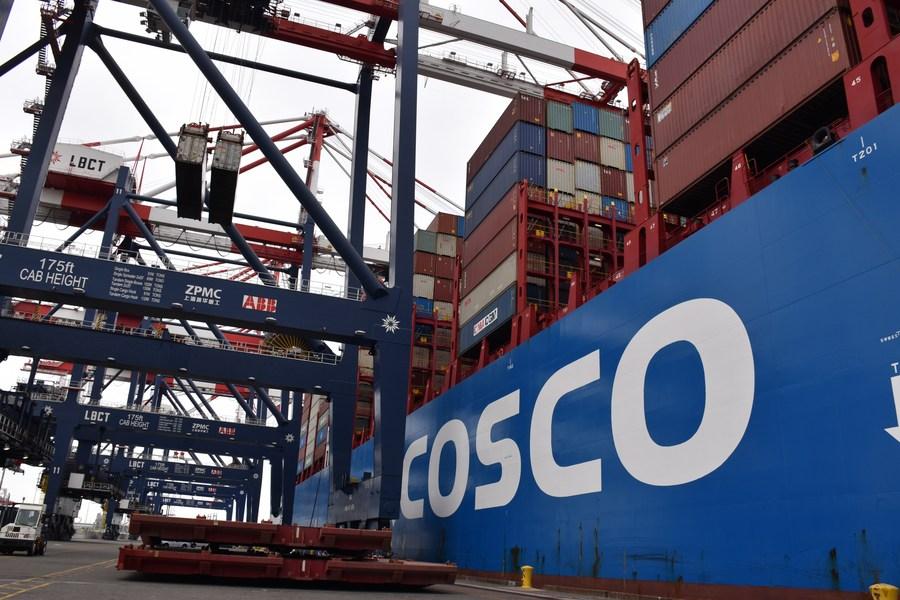

People are seen with the U.S. Capitol building shrouded in haze in the background in Washington, D.C.
, the United States, on June 29, 2023. (Photo by Aaron Schwartz/Xinhua)
There has been a sharp increase in the proportion of Americans harboring negative feelings about China -- this is a conclusion several Western media outlets came to recently after analyzing decades of opinion polls.
The polls, if reliable, have unveiled a dangerous anti-China path taken by the United States, which has everything to do with Washington's toxic rhetoric and policies on China deliberately designed and calculated to serve both America's election politics and the White House's "Take China Down" end goal.
For long, China has been a big "bogeyman" in American politics, and blaming China has been politically correct in Washington. The anti-China atmosphere heats up almost every time when Republicans and Democrats face off against one another in presidential elections.
To bring as many voters as possible into their own camp, the two parties vie with each other to be the first to expose a so-called "evil" China. And to outdo their election rivals, candidates from both sides rush to prove throughout their campaigns that they are the quickest to save Americans from the "China threat." This anti-China culture has, over time, brainwashed a growing crowd of the American public.
The "Corona Big Book" disclosed three years ago, for example, has revealed much about this low-cost campaigning scheme used by U.S. bipartisanship. In this strategy playbook, Republican candidates are advised to address the COVID-19 pandemic by aggressively attacking China, and provided with detailed guidelines on everything from how to tie Democratic candidates to the Chinese government to how to deal with accusations of racism.
Grabbing electoral gains is not the only reason for anti-China forces in Washington to mislead American public opinion. For those China hawks, estranging Americans from China also helps hobble the Asian country's rightful development and maintain America's diminishing global hegemony.

A container ship of China's COSCO Shipping docks at a container terminal of the Port of Long Beach in California, the United States, Aug. 20, 2021. (Xinhua/Gao Shan)
An analysis of the Western media outlets has shown that former U.S. President Donald Trump's anti-China language and trade war have turned many Americans' opinions sharply negative, and the policy of the current U.S. administration has since driven American perceptions of China to record lows.
This is not surprising at all, given what Washington has said and done particularly since 2018. Using the pitiful zero-sum logic that America can only win by taking China down, Washington has embarked on a grand crusade waving the banner that reads "China is the enemy."
From badmouthing China's human rights efforts, spreading a COVID-19 lab-leak conspiracy theory to peddling "decoupling" and its more cunning version of "de-risking," and from imposing coercive and unilateral sanctions to blocking normal people-to-people and cultural exchanges between the two countries, U.S. hardliners in Washington have racked their brains to alienate the American public from China, never doubting for a second that doing so won't help bring back America's short-lived "unipolar moment."
The thing is, the China-U.S. relationship, as one of the world's most important bilateral relations, influences the welfare of both countries and the whole world, and the foundation of this relationship depends on the people.
This foundation hasn't crumbled yet, fortunately. The touching story of an American woman called Elizabeth Gardner who finally fulfilled her late husband's last wish to return to the hometown of his childhood by traveling from the United States to Kuliang, or Guling in Mandarin, and the most recent visits of American entrepreneurs like Bill Gates and Elon Musk to explore business opportunities and tap cooperation potential in China, have all proven that there are always sober minds in America that back a sound and stable China-U.S. relationship and cherish the hard-won bilateral friendship.
If U.S. politicians truly care about Americans as they claim, they should get rid of any toxic politics, and start to handle bilateral relations in a responsible way that serves the fundamental interests of both the American and Chinese peoples.
